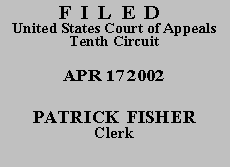

| JAMES PHILLIPS,
Plaintiff - Appellant, v. PUBLIC SERVICE COMPANY OF NEW MEXICO, Defendant - Appellee. |
|
We review the district court's dismissal of appellant's complaint without prejudice for failure to effect service under an abuse of discretion standard. Scott v. Hern, 216 F.3d 897, 912 (10th Cir. 2000). We review appellant's pro se pleadings liberally. Haines v. Kerner, 404 U.S. 519, 52021 (1972); Cummings v. Evans, 161 F.3d 610, 613 (10th Cir. 1998). Having reviewed appellant's "Motion to the Court," we conclude that the district court did not abuse its discretion in dismissing the complaint without prejudice. This document, filed three days after the court's show-cause deadline, discusses only matters relating to appellant's substantive claims, including his filing of charges with a state agency, additional allegations of discriminatory incidents and conduct, allegations regarding discriminatory treatment of other employees, and defendant's investigation of prior events. The document contains several sections entitled "Rebuttal," which appear to respond to contentions made by defendant, although appellant never showed that defendant had been served in this case and defendant had not filed any documents or pleadings. The "Motion to the Court" does not, in any way, respond to or satisfy the district court's order to show cause as to why defendant had not been served.
Further, on appeal, appellant does not address the show-cause order other than by asserting that he sent a document to the district court within the show-cause order deadline. However, the record evidences only that the "Motion to the Court" was filed three days after the deadline, which, as noted above, did not satisfy the district court's order. Accordingly, we affirm the district court's dismissal of appellant's complaint without prejudice.
The district court also noted an additional ground for dismissal. Based on a review of appellant's complaint, the court concluded that the claims brought in the present suit "are identical to those previously litigated" by appellant in a lawsuit brought against defendant, his employer, in 1997. (R. Vol. I, doc. 6, at 2.) The court noted that the issues brought in the prior suit were fully and finally determined by the court, were dismissed with prejudice, and "may not be revived in a new lawsuit." (Id. at 3.)
We express no opinion about whether the issues appellant attempted to raise in this lawsuit are, in fact, identical to those raised previously. Appellant's pleadings are vague and difficult to understand, and his suit was dismissed at an early stage in the proceedings. We agree with the district court that, to the extent appellant's claims are based on incidents and matters raised in his earlier law suit, he is precluded under the doctrine of collateral estoppel from bringing those claims again. See Willner v. Budig, 848 F.2d 1032, 1034 (10th Cir. 1988). However, we note that appellant alleged in his current complaint that the discrimination, retaliation, and harassment have "been an ongoing issue." (R. Vol. I, doc. 1, at 2.) Appellant filed another document on the same date as his complaint, entitled "Notice to File Charge of Discrimination," in which he also complained that the alleged discriminatory conduct "continues to this day." (Id., doc. 2, at 1.) Claims based on events subsequent to those set forth in appellant's 1997 complaint, whether alleged as discrimination or retaliation, would not be precluded under collateral estoppel theories.
For the forgoing reasons, the judgment of the district courtis AFFIRMED. Appellant's motions to the court requesting a change of venue are DENIED.
ENTERED FOR THE COURT
Circuit Judge
*. After examining the briefs and appellate record, this panel has determined unanimously that oral argument would not materially assist the determination of this appeal. See Fed. R. App. P. 34(a)(2); 10th Cir. R. 34.1(G). The case is therefore ordered submitted without oral argument. This order and judgment is not binding precedent, except under the doctrines of law of the case, res judicata, and collateral estoppel. The Court generally disfavors the citation of orders and judgments; nevertheless, an order and judgment may be cited under the terms and conditions of 10th Cir. R. 36.3.